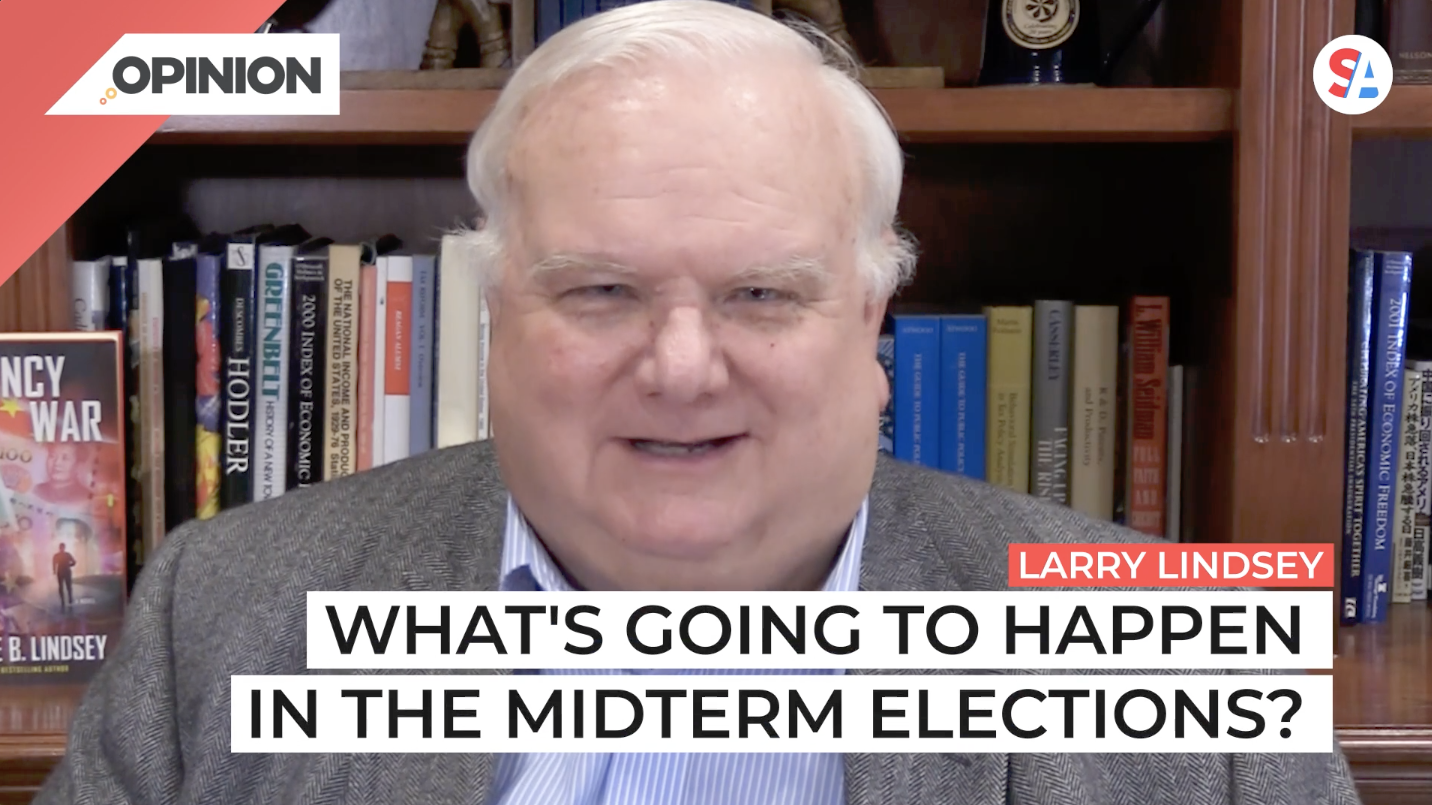
Commentary
-
Our commentary partners will help you reach your own conclusions on complex topics.
Lots of people are asking what’s gonna happen this coming November when we have our midterm elections. Well, a day is a long time in politics and things are uncertain. But still, one could look at the poll numbers and not just at the headlines, but deep inside them and get a sense of what’s going on.
The most remarkable thing about the polls is how stable they’ve been. Things really haven’t budged since last November. The president is running in a fairly consistent margin – 41% approve, 53% disapprove. And that difference has been roughly within one point ever since November.
The so-called generic ballot, which ask prospective voters which party they’re going to vote for in the House in the upcoming November elections has also been remarkably stable. Democrats have been at 42%, plus or minus one point, Republicans have been at 45% plus or minus two and a half points.
In either case that probably looks pretty good for the Republicans. Our view is if that holds, the Republicans will gain about two dozen seats.
But the poll numbers also point out some very important things. Being disappointed or disapproving of President Biden doesn’t necessarily guarantee people are going to vote Republican in November. If you just look of the numbers I just cited, Republicans are running eight points behind the disapproval level. 53% disapprove of Biden, but only four 45% say they’re going to vote Republican as a result. On the other hand, the number of Democrats…people who say they’re gonna vote for the Democrats is almost identical to Biden’s approval level: 42 and 41%. That implies a number of things.
First of all, the Democrat vote has probably bottomed out. If things stay as they are, Republicans will probably win but it’s gonna depend on those 8% who disapprove of Biden, but have yet to decide they’re going to vote Republican. The odds are many of them will. The odds are that perhaps many of them will stay home.
But how those voters break is going to determine whether the Republicans have a very good night in November, or just an okay night. And if they happen to break for President Biden, he becomes suddenly much more proven, the Democrats have a chance to hold onto the Congress. So we have to watch that group very carefully.
Another issue that has people…have talked a lot about is so called gerrymandering. Well, this has been going on since the start of the Republic. It’s true in most countries as well. Someone has got to draw the election district lines and in America, we’ve traditionally left it up to the state legislatures to do so. Although recently the courts have gotten involved. Well, the expectation a few months ago was that redrawing district lines, gerrymandering if you will, would favor the republicans. Republican states basically gained five congressional seats as a result of the Senate.
And those would likely come from the Democrats, but experts who analyze the districts as they’ve actually been drawn now expect Democrats to add 12 seats from the gerrymandering process. Six at the expense of republican districts and six at the expense of swing districts. Now, gerrymandering doesn’t necessarily mean you win the district. What you do is you make your districts a little bit closer in order to get more of them. You spread your voters out.
Well, in case there’s a wave election, you’ve also narrowed the guarantee that your congressman will get reelected. So we’ll have to wait until November to see how it actually plays out, but at least for now, it’s pretty clear. The Democrats have won the gerrymandering battle in the country.
Now there’s still a lot to go. And most important is gonna be the selection of who the candidate is and both parties have their divisions. The Democrats, it’s between the progressive faction and the much more traditional moderate faction of the Democrats. And the Republicans, it’s between fervent Trump supporters and more normal Republican choices.
Do you want to go to your base and try and maximize your own party’s turnout? Or do you want to go to the center. Generally going to the center is on net, helpful. It depends a little bit on the personality of the candidate, but that still lies ahead of us. So the truth is we don’t know who’s going to win in November. Uh, as Leonid Brezhnev, that famous political philosopher said, “the trouble with free elections is you never know who’s gonna win.”
-
Election 2024 will boil down to the Great Lakes states
Pollsters and pundits have been engaged in a long debate about how Biden or Trump might win the 2024 election, with much of their focus spent on the “swing state” electoral battlegrounds. While the winners of Alabama or California may be obvious, for instance, who wins Pennsylvania is a more difficult question. Watch the above…
-
Why the Fed should consider Theory of Reflexivity when fixing policy
The Theory of Reflexivity, often used in the context of economics and financial markets, implies that investors don’t base their decisions on reality but on their perceptions of reality. This creates a feedback loop where investors’ perceptions influence economic fundamentals, which in turn alter investor perceptions. Watch the above video as Straight Arrow News contributor…
-
Federal Reserve surpassed its own wildest expectations
On May 14, the U.S. Bureau of Labor Statistics released the most current producer price index (PPI) report, which showed an increase of 0.5% month-over-month in April. After the report’s release, U.S. Federal Reserve chairman Jerome “Jay” Powell said that while he believes the current policy rate is restrictive by many measures, the Fed needs…
-
Polls give slight advantage to Trump in Electoral College
With the U.S. general election only six months away, leading candidates President Joe Biden and former President Donald Trump appear to be engaged in a very close contest. In their 2020 race, the winner of the Electoral College was ultimately determined by a relative handful of voters in just a few swing states, even though…
-
College sports is big money but not everyone benefits
March Madness has wrapped up and Caitlin Clark has emerged as a household name as well as a wealthy student athlete. Earning over $3 million throughout her college career, her success stands in stark contrast to the previous notion that collegiate athletes shouldn’t earn anything beyond their scholarship. Straight Arrow News contributor Larry Lindsey examines…
Latest Opinions
-
 U.S. Department of Defense
U.S. Department of Defense
Congress still trying to figure out how to reduce wasteful military spending
-
 DVIDS
DVIDS
US Navy, Air Force making waves with new weapons at RIMPAC
-
 Getty Images
Getty Images
Israeli PM Netanyahu meets with Trump at Mar-a-Lago
-
 Getty Images
Getty Images
Growing US nuclear power resurgence reaches the nation’s heartland
-
 Getty Images
Getty Images
Beer from the sun, other solar thermal projects get government funding
Popular Opinions
-
In addition to the facts, we believe it’s vital to hear perspectives from all sides of the political spectrum.


